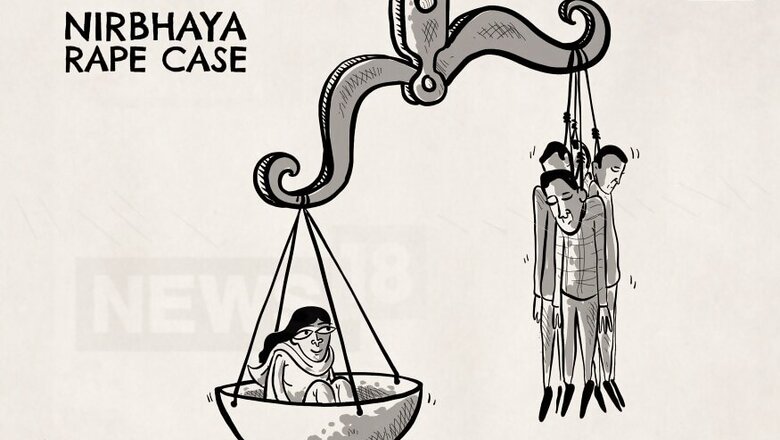
views
New Delhi: The Supreme Court on Monday affirmed the death penalty awarded to the three convicts in the Nirbhaya gang rape and murder case, but the death row convicts still have legal recourse available to commute their sentence to a life imprisonment if not a complete acquittal.
A bench comprising Chief Justice Dipak Misra and Justices R Banumathi and Ashok Bhushan junked the review petition filed by Mukesh (29), Pawan Gupta (22) and Vinay Sharma (23), saying there is no ground to reconsider the verdict.
The fourth death row convict, Akshay Kumar Singh (31), had not filed a review petition against the apex court's May 5, 2017, judgment.
Now the way ahead for the convicts would be to either approach the Supreme Court through a curative plea seeking commutation of the death sentence and in case the Supreme Court rejects their curative petition, the last resort would be to file a mercy plea before the President of India.
But bringing in a fresh change to this order, a Constitution bench headed by Chief Justice RM Lodha in July 2015 had said that all the death row convicts, whose review petitions have already been rejected but their sentence has not been executed, may file fresh petitions for an open court hearing of their review pleas within a month and they will be heard for at least half an hour.
However, in the cases where the curative petition has already been decided, the death row convict will not have this opportunity to avail the open hearing.
This means that the Nirbhaya convicts whose review petitions have been rejected can avail this opportunity of an open court hearing for thirty minutes.
The constitution bench verdict came on a batch of petitions seeking that their plea for the recall of verdict upholding their death sentence should be heard in the open court by a three judge-bench.
One primary consideration for a death sentence to be commuted to life imprisonment is usually with the time taken by the court to settle the matter and the number of years the prisoner has spent behind bars.
In March 2014, SC commuted the death sentence of 1993 Delhi bomb blast convict Devinderpal Singh Bhullar to life imprisonment after the Centre had also backed the reduction of his sentence.
"Due to an inordinate delay for eight years, the Supreme Court said death could not be awarded to Bhullar," Bhullar's lawyer KTS Tulsi told reporters outside the apex court.
The lawyer said that the apex court had taken into consideration the medical reports of the convict, especially the last report of the medical board which unanimously said Bhullar continues to suffer from mental illness.
In the case of Nirbhaya, the total time taken for the review verdict to be delivered has been six years. Now if more years are taken for the curative plea and then the mercy petition to be decided, the court can take into account the number of years the accused has languished behind bars.
Secondly, considering the suicide of one of the accused in the jail, possibility of a mental illness developing in either of the convicts cannot be ruled out.
In either of these circumstances, there may be a possibility of the commutation of death penalty to a lifer.
Even for the President, it cannot act on its own while deciding on a mercy petition and must act in aid and advice of council of ministers.
Considering that now even the fourth convict is yet to file his review petition which is likely to be listed next week, another fresh round of hearing on similar points would be awaited at the SC.
The 23-year-old paramedic student was gang-raped on the night of December 16, 2012 inside a running bus in south Delhi by six persons and severely assaulted. She succumbed to her injuries on December 29, 2012 at Mount Elizabeth Hospital in Singapore.
One of the accused, Ram Singh, had allegedly committed suicide in Tihar Jail. A minor was convicted by the Juvenile Justice Board. He was released from a reformation home after serving a three-year term.




















Comments
0 comment